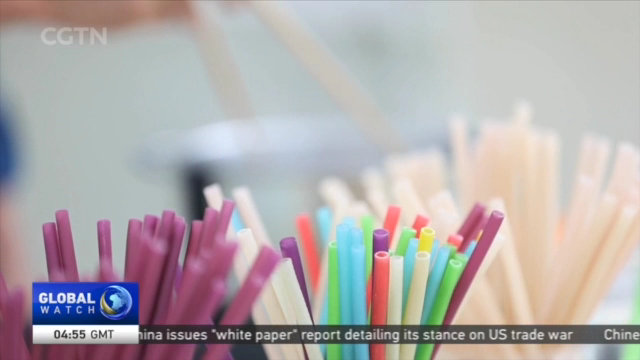
13:27, 02-Jun-2019
Fighting Plastic Pollution: Firm makes clean straws that can be eaten
Updated
09:41, 04-Jun-2019
03:24

Researchers say up to 8.3 billion plastic drinking straws litter the worlds coastlines. The daunting plastic waste problem is triggering campaigns to get consumers to stop using plastic straws, including in China. In the run-up to World Environment Day on June 5th, CGTN has several stories on China's fight against pollution. Han Peng starts it off with a new way of thinking about straws.
Can you believe what this man is doing? With just a few minutes of boiling, he says his newly invented drinking straws are so environment-friendly that they can be cooked. AND EATEN.
LOU ZHONGPING, PRESIDENT SOTON DRINKING STRAWS "The straws are made out of starch. The point is: If humans can eat and digest these straws, then nature can as well."
Lou Zhongping presides over one of the world's largest companies making nothing else but drinking straws. Based in China's capital of small commodities, Yiwu, Lou is a hidden billionaire behind many global beverage brands. He says his factory supplied almost all the plastic straws for Starbucks in China, the American coffee brand's biggest market.
HAN PENG YIWU "Plastic straws are made of polyethylenes like this, and this factory can produce 6,000 straws every second."
But his booming plastic production lines could be heading to a dead end. In China, photos of plastic waste causing lifelong suffering of sea animals circulate on social networking sites, sparking nationwide outrage. Around the world, countries including the UK and US have begun calling for a ban on plastic straws. And here in Shanghai, Starbucks is among the many brands that announced it will stop using plastic straws.
JI LINGYUN, BARISTA STARBUCKS "Not all the customers like the idea, but we explain to them that we are doing this for the sake of our future generations."
Compared to plastic, paper straws can easily soften, but it also means it's easier to degrade.
Some domestic coffee and bubble tea vendors are replacing plastic with paper.
HAN PENG SHANGHAI "It takes half an hour to drink a cup of coffee with a straw, but if it's plastic, it will take nearly half a millennium for the earth to finally digest and degrade all the plastic waste."
Back in Yiwu, Lou understands he stands to lose billions in profit if he does not move fast. He's aggressively replacing old machines with paper straw production lines. But he is not satisfied with just that.
LOU ZHONGPING, PRESIDENT SOTON DRINKING STRAWS "Paper straws have huge environmental costs, too. You need to cut down trees and emit pollutants during production. So someday there might be another campaign. That's why we are one of the earliest to develop starch-based straws. But we are still working on how to slow down its softening process, after being immersed for one hour."
The 54-year-old straw tycoon dropped out of school at the age of 14, and made a living through street-vending.
He built one of China's earliest plastic straw workshops in 1993. Today, he wants to reinvent straws in the face of daunting plastic pollution. Han Peng, CGTN, from Shanghai and Yiwu.

SITEMAP
Copyright © 2018 CGTN. Beijing ICP prepared NO.16065310-3
Copyright © 2018 CGTN. Beijing ICP prepared NO.16065310-3